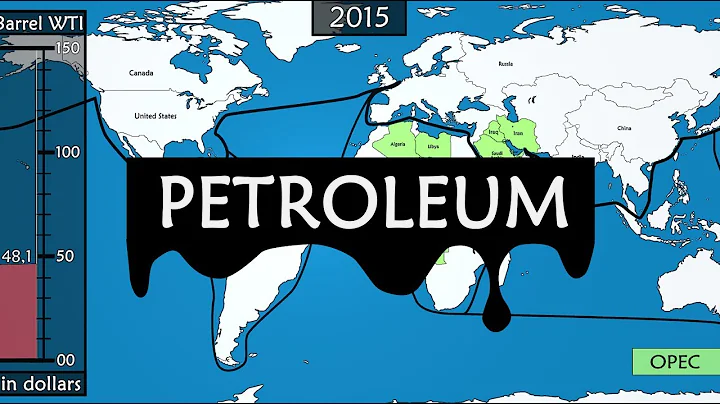A private company monopolizes 95% of the country's oil refining capacity, owns 90% of the country's oil pipelines, and 25% of the country's oil production. This is almost unimaginable today.
But in the United States in the 1890s, this scene actually happened. This company is called Standard Oil Company. Maybe you have never heard of its name, but it doesn’t matter, because you must have heard of its founder:
John Davidson Rockefeller, the famous “Oil King”, was also 19 The first real "billionaire" of mankind in this century.

However, just such a company was dismembered by the US government in 1911, becoming the famous "first antitrust case" in the history of world business.
So why does such "non-market economy" behavior occur in the United States, which believes in free market economy ? What are the dangers of monopoly, and why has it become a target of unanimous attack by countries around the world?
01
In 1839, Rockefeller was born in a poor family in upstate New York, USA. Counting him, there were 6 sisters in the family.
Many people rumored that Rockefeller was Jewish , but in fact his father was of mixed English and German descent, and his mother was from Irish , and he had nothing to do with the Jews.
However, there is an old saying that describes him, which is quite true: The children of the poor become rich early. When he was 16 years old, young Rockefeller gave up his studies and became a bookkeeper.
At this time, he began to show his extraordinary business talent: Because he was good at controlling costs, Rockefeller was deeply appreciated by his boss, and in just two years, he offered him a sky-high annual salary of US$600.
However, Rockefeller is not a creature of the pool after all. In 1858, the 19-year-old Rockefeller chose to go it alone, targeting the oil industry where he would devote his life to the future.
Through the accumulated connections, he successfully found a financial backer named Clark and a chemist named Andrews, and the three of them established the first refinery in Cleveland.

Yes, you heard it right, the official name of this company is Standard Oil Company. Behind these 11 English letters, there is no doubt that Rockefeller's huge ambition is revealed: My product's goal is to lead the industry standard.

In fact, Rockefeller did achieve his goal, but what is less known is that the road was full of filth and blood.
02
1872 was an important year for Rockefeller, and it was also the year when Rockefeller ushered in the first highlight of his career.
From February 17 to March 28 of that year, in less than 40 days, Rockefeller annexed 22 competitors in Cleveland, and once bought 6 oil refineries in 48 hours.
Seeing this, you may think that Rockefeller was a shrewd oil businessman who made a lot of money from one-third of an acre of oil refining. But you would be wrong, because soon Rockefeller would turn the entire oil industry upside down.
In the mid-1870s, when Standard Oil monopolized 90% of the U.S. refineries, Rockefeller became dissatisfied with the U.S. oil transportation system. In pursuit of profit, he chose to build a separate pipeline, bypassing his partner, the Pennsylvania Railroad.
This move naturally caused dissatisfaction with Pennsylvania Railway. However, driven by interests, Rockefeller had no control over the spirit of the contract and simply ignored the Pennsylvania Railroad's protests, and a war between the two sides was imminent.

The railway company took the lead and began to invest in the acquisition of oil refineries. Rockefeller showed no sign of weakness, and the two sides launched a price war. It stands to reason that in business, business wars are nothing more than commercial means.
But Rockefeller didn't think so. On the contrary, he used all kinds of tricks.
bribed congressmen, bribed the courts, hired gangsters to destroy the opponent's production materials, and even directly threatened the opponent's personal safety. All the tricks that could make the opponent surrender were used in various ways. What is the final result of
? Naturally, Rockefeller won. However, he didn't win everything, because through despicable means, he succeeded in attracting the attention of the largest institution in the United States - the U.S. federal government.
03
In 1890, Rockefeller's life reached its peak. 95% of the U.S.'s refining capacity, 90% of its oil pipelines, and 25% of its oil production are owned by Standard Oil.
In order to facilitate management, Rockefeller announced the establishment of an industry trust, exchanging the shareholders of dozens of companies originally controlled by Standard Oil Company for the stocks of the newly established conglomerate, that is, trust .
The exchange condition is that it must be delivered to 9 trustees, including Rockefeller.

Some friends may not understand its meaning. To put it simply, Rockefeller used financial means to remove some of the power of small and medium-sized investors, only giving them the right to dividends and depriving them of their management rights, which is equivalent to a federal country. The transformation to unitary state has completed the centralization of power within the company in disguise.
From the perspective of a company operator, there may be nothing wrong with establishing a trust. But from a social perspective, the negative effects of an industry trust will be far greater than the profits it creates.
First of all, for the industry itself, the establishment of a trust is inherently exclusive.
Whether intentionally or unintentionally, it will definitely take advantage of its scale advantage and market dominance to do whatever it wants, such as unreasonable price increases or overlord clauses in contracts.
is a sickle that cuts off the supply side of raw materials upstream and ordinary consumers downstream, killing all small and medium-sized enterprise competitors. Only it makes a lot of money.

Secondly, for the country, due to the interoperability between industries, for example, the increase in oil prices will definitely lead to a decline in automobile demand, and the sluggish demand for automobiles will bring about a sluggish steel industry.
By extension, when trusts monopolize the entire industry, related interoperability industries will inevitably be affected.
The modern economic system is very fragile, with many industries experiencing both prosperity and loss. Dedicating the country's economic lifeline to a few monopolies is as dangerous as smoking at a gas station.
It was precisely because of the clear understanding of the harm of trusts to the market economy that the U.S. government introduced the famous "Sherman Antitrust Act" in 1890.
Twenty years later, under the leadership of Roosevelt himself, and the Federal Supreme Court ruling, the U.S. government single-handedly dismembered this standard trust enterprise into 34 small companies, including Shell, , Mobil, etc. Well-known oil company.

However, the once prosperous Standard Oil eventually disappeared. Perhaps even to his death, Rockefeller did not understand why all his life's hard work ended up being wasted.
But this is irrelevant, because from the moment he decided to found Standard Oil Company, he was destined to be alienated by capital.
Author: Jinling Fengyu





















